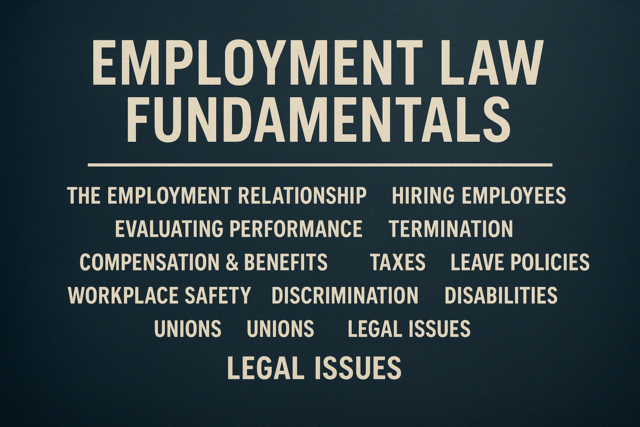Alternative dispute resolution is gaining in popularity because it is a less expensive and relatively stress-free way of solving the problem. It usually yields much faster results. The two most common alternative forms are mediation and arbitration.
These procedures are gaining in popularity as alternatives to litigation that otherwise would have ended up in court.
Mediation
Mediation: A neutral third party, usually a trained mediator, will meet with each side (employer and employee) to listen to that party's list of complaints against one another and try to counsel them so that both sides can reach a mutually agreeable resolution. Usually the mediator will help both sides work toward a resolution by identifying the problem, defining the grievances, and discussing the points on which the two parties disagree. A mediator does not function as a judge and decide the case. Rather, the mediator works more as a counselor to help the two parties work out their differences.
Mediation is an informal and cooperative problem-solving process. Neither side has to know the law, nor must either side hire a lawyer.
Arbitration
Arbitration: The dispute is submitted to a neutral third party, who hears the matter and makes a decision for both sides.
Compared to mediation, arbitration is a more formal process. Both sides will be asked to present evidence and bring forth witnesses to support their arguments. The arbitrator functions more like a judge. The arbitrator will listen to the case as presented by each side and will then render a written decision to resolve the argument. Generally speaking, the decision of the arbitrator is final.
The great benefit to arbitration is that it eliminates many of the formalities and need for knowledge of the law and legal proceedings. It is usually less expensive than going to court, and typically will yield fast results.
The only downfall to arbitration is that it is only binding when both parties agree in advance to accept the finality of the arbitrator's decision. Many businesses include arbitration clauses in their contracts with other businesses and with the employees that they hire. If you signed a contract that specifies agreement to arbitration should a dispute ever occur, the courts will enforce such a provision. By signing the agreement, the employer and employee have agreed to the binding finality of an arbitrator's decision.
The greatest benefit to arbitration and mediation is that it saves time for both sides. Legal court cases can take months, even years, to get a decision. With mediation or arbitration, a decision can typically be made very quickly. It is less expensive for both sides. In fact, some courts actually order companies with disputes into mediation or arbitration before agreeing to hear the case in court.
Here are some links to a number of mediation and arbitration associations:
www.abanet.org/dispute/community.html
When you believe someone has breached a contract with you, you really do have several options. Most of the time, all it takes is some good communication between the two affected parties to try to come to some sort of an agreement without taking the case to court.
Small Claims Court
Small claims court is the best vehicle to recover debts up to $10,000. The procedures are simpler than other types of court cases, and there is usually not as long a wait to have your case heard. In order to win the case, you will have to prove that the debt exists, how much is owed, and when the payment was due. Usually you do not need a lawyer to file the case or to represent you in court. However, you will be required to appear in court or have someone to appear on your behalf.
Class Action Suits
Class action suits are typically filed when a number of people have a similar complaint against someone. Should you, as the employer, be informed of a class action suit against you, it could likely mean that you have a basic problem with how you deal with your employees, and more than one believes you have violated some type of labor or employment law. In a class action, the plaintiff must get the court to approve litigation representing a group of similarly situated individuals. Such a suit is filed on behalf of a group of people who have been injured in some way by your company.
Most often, the grievance is due to hiring or firing and salary practices that the employees claim are illegal.
Hiring a Lawyer
As an employer, you will likely have need of the services of a lawyer from time to time. The question becomes one of finding the right lawyer for your needs. Face it, there is absolutely no substitute for experience. You want someone who is experienced and has represented businesses before; and when you are just starting your place of business, a good and experienced lawyer will likely suit your needs. Once you grow and begin to have more specialized needs, you may have to branch out and get more specialized legal help.
The best way to find a good lawyer is to get referrals. Solicit referrals from:
- other business people;
- other lawyers;
- bar associations;
- friends;
- state and national certification programs.
Once you get a couple of referrals, you need to do some legwork. You will want to meet with the lawyers in person and actually do some comparison shopping before you hire a lawyer to represent you and your business. Start by asking some of the following questions:
- How long have you been in practice?
- What percentage of your practice is directed toward my type of legal needs?
- Are you a specialist? For how long? What memberships or certifications in this specialty do you have?
- Can you provide me with a few references?
- What is your initial consultation fee?
- What do I need to bring to the initial consultation?
- What steps are involved in handling this matter? How long will it take? Are there any alternatives?
- If this is a matter that may go to court, what outcome do you expect? Be specific when asking about the time involved, costs to you, size of awards, and burdens you will be required to bear.
- Who will be working on the case? You or a junior partner? What experience and expertise can I expect to be given if someone else handles the case?
- What can I do to help? How much will this cost me?
Be sure to get a specialist if you need one. As with the medical field, law has become very specialized and it pays to have someone who is knowledgeable about your area of law representing you. Make specific inquiries to ensure that your lawyer is well-versed in the areas of employment law. Your attorney needs to be familiar with your business and have a basic understanding of how it operates.
Be careful of hiring an attorney who might put a new lawyer on your case every month. You will be paying for that person to learn the specifics of your business. You really want a lawyer who will run the whole race with you.
Resolving Disputes In and Out of Court
As you have learned, there are numerous ways to settle disputes. Some involve soliciting the help of a mediator or an arbitrator. Others involve the courts and the legal system. As an employer you may have to decide whether or not to fight a case or to settle out of court.
You may be given advice by your attorney to simply settle because it is expedient for both of you to do so. If this goes against your instincts, you may need a different lawyer. Your lawyer works for you and thus should be aggressive about helping you to get rid of problem employees before they poison the rest of your employee pool.
You might be advised not to discipline an employee; the advice should also include how you must proceed in order to reach your goal. A lawyer who has your best interests at heart is the lawyer for you. When deciding whether to settle or to fight, consider the following:
- what you risk if you lose the case;
- the cost of going to court, including potentially paying the opposing side's legal fees if you lose the case;
- loss of working time by your own employees who may be called as witnesses and the loss of your own time at work;
- whether the settlement might make you more vulnerable to another unrelated case in the future;.
- poor public relations should the case become public. Mediation and arbitration are relatively private matters. Court cases become a matter of public record.

























